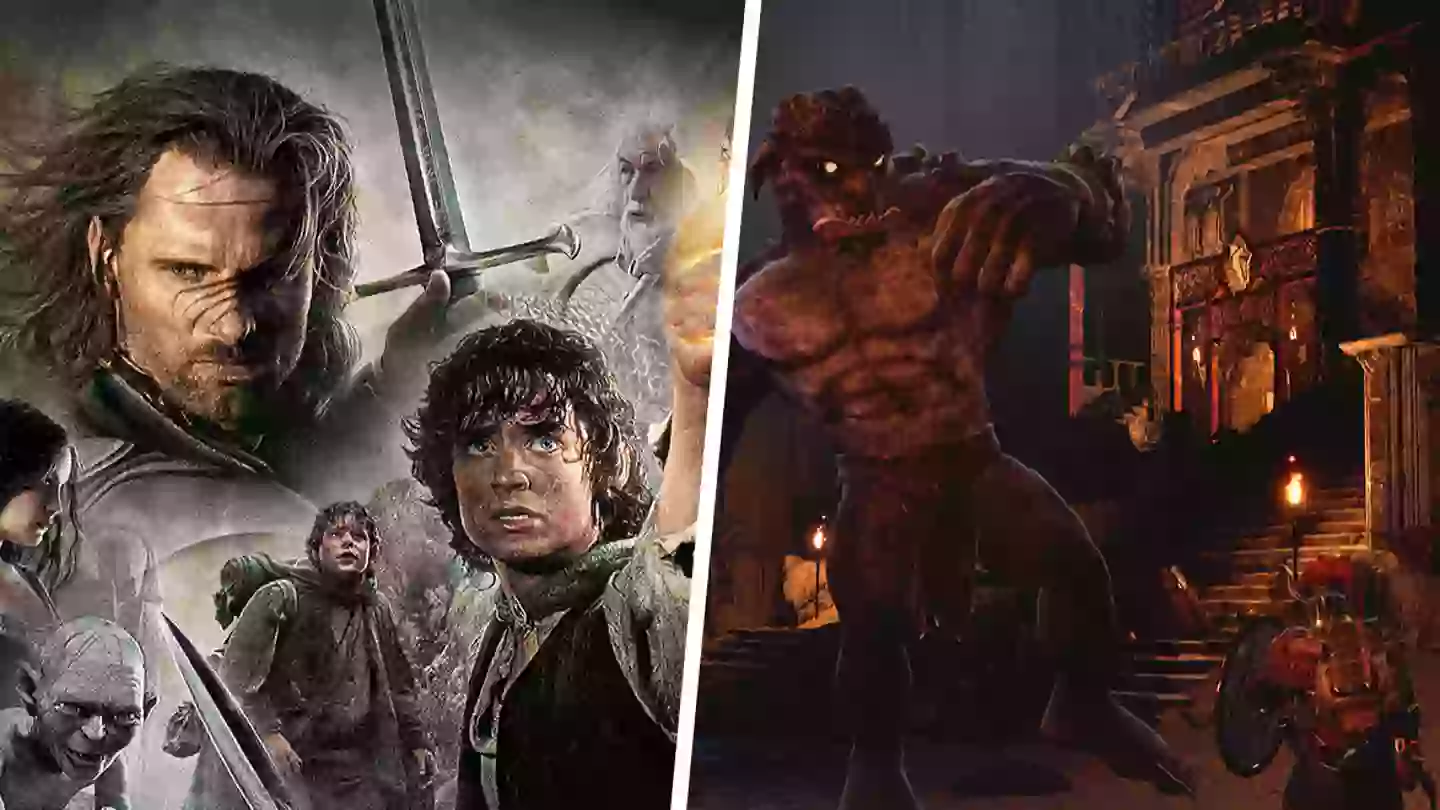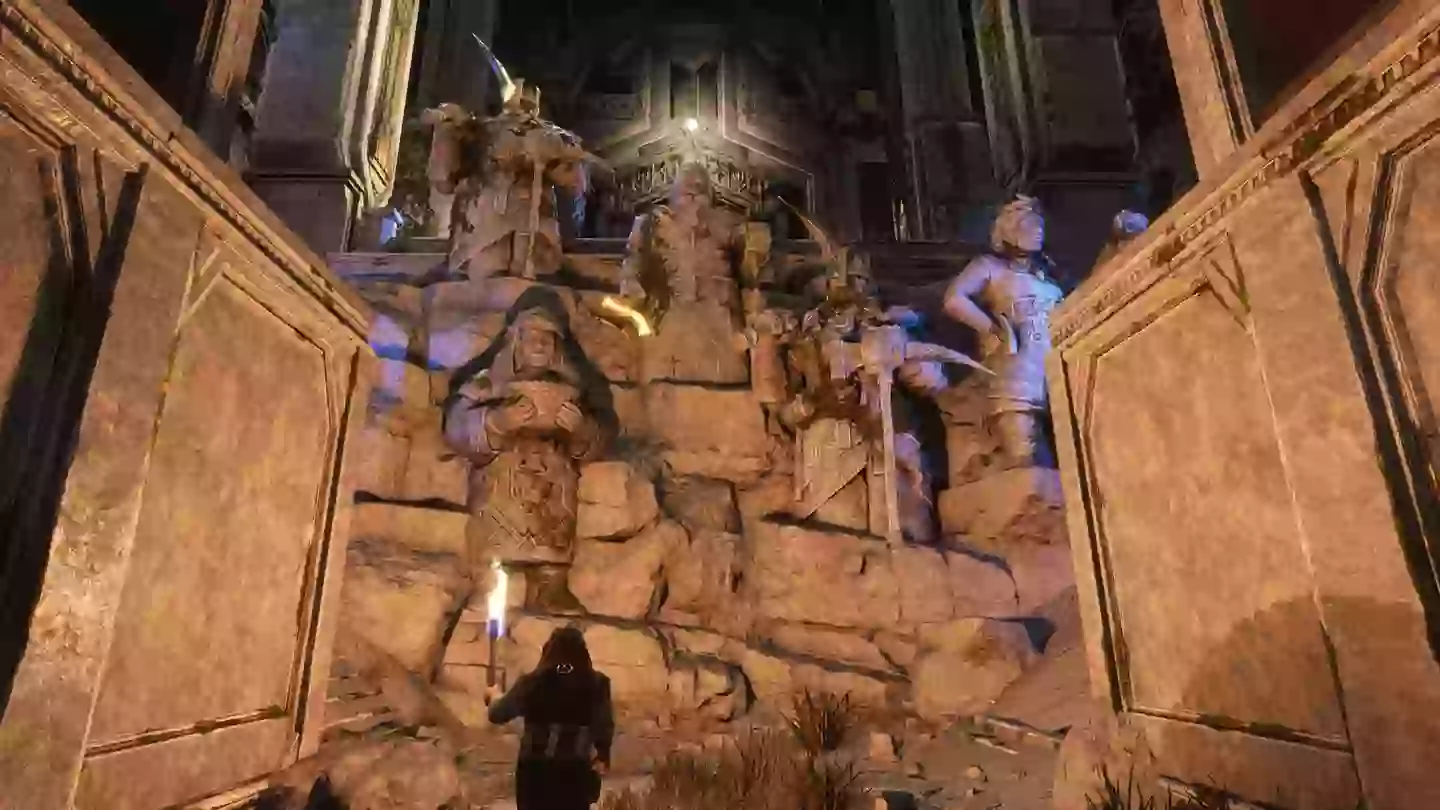
There aren’t many gamers in 2023 who would hear the words “survival-crafting” and immediately leap out of their seats in excitement. It’s a well-trodden genre at this point, one that arguably has more misses than hits.
And yet into this arena steps a game based on The Lord Of The Rings with a concept so simple, so clean, and so inspired that I’m amazed it hasn’t been done before.
Developed by Free Range Games, The Lord of the Rings: Return to Moria asks the question: what if we had a Minecraft-style survival game set in Middle-Earth, focused on the dwarves?
Advert
Take a look at The Lord of the Rings: Return to Moria in action below.
As far as elevator pitches go, it’s one that should pull you in immediately. In pretty much every fantasy story dwarves are miners, and dedicated craftsmen. It’s what they do. So to finally get a Lord Of The Rings game in which we play as dwarves doing the things dwarves do best? Well, it could very easily end up being the most authentic video game adaptation of Tolkien’s work to date.
Return To Moria takes place in the Fourth Age which, for those of you not versed in Tolkien lore, is the era after Return Of The King, the fall of Sauron, and the adventures of the Fellowship. This is a period that Tolkien touched on but never fully explored, which gives Free Range Games free, um, range to colour outside the lines and tell some new stories without worrying about treading on established lore.
Advert
You’ll play as a dwarf tasked with exploring the long-abandoned Moria, deep under the misty mountains. Your goal? To reclaim your home, explore, recover artefacts, and delve ever deeper into the dark.
Like so many survival-crafting games, Return To Moria is procedurally generated, although certain key landmarks will always remain in the same place - both to give players a way to get their bearings and to remain true to the lore of the area.

The core gameplay loop is simple enough: you travel deep into the mountains, discovering new rooms, gathering resources, fighting enemies, and managing your hunger. Basic survival stuff. But Return To Moria shines in its attention to detail.
Advert
Make too much noise, for example, and you attract a horde of orcs who could run you down in seconds. The mines have, after all, been infested by orcs and other monsters who have scurried into the darker corners of Middle-earth since Sauron kicked the bucket. How you fare against these enemies depends entirely on how prepared you are, so you’ll have to weigh up how much deeper into the world you’re willing to explore before stopping to build a base and stock up on supplies and new gear.
Absolute safety is hard to come by when you’re miles beneath a mountain, of course. Fortunately you can craft a wide range of bases and fortifications to give yourself the best possible chance of survival. You’ll find yourself returning to these safe(ish) havens regularly to cook meals, sleep, repair gear, and brew beers. There doesn’t seem to be any real limit on what you can create, and before long you could have a network of safe-houses all connected by fast travel points.

That’s not to say orcs won’t come knocking though. At various points while relaxing in one of your homes the trick buggers will attempt to lay siege to your hard work. How well you fare depends on the quality of your fortifications, obviously, but in a fun little detail you’re also granted buffs depending on how much treasure you have at your base. Dwarves are fiercely protective of their gold above all else, as I’m sure you know.
Advert
It’s clear that Free Range has a ton of love for the source material. At one point during our demo I watched as a troll was lured into a rare patch of daylight and instantly killed as it turned to stone. A smart way to avoid a fight with a terrifying beast, though I’m assured we won’t always be able to rely on a readily available source of daylight when we come up against trolls. Oh, and you can actually mine the trolls you turn to stone and grab precious gems and minerals, which is fun. Or, if you like, you can build a base around them and keep them as a decorative statue.
In another fun touch you recover health by drinking beers instead of potions, and will often find yourself chugging back a stout before a big fight. But the real draw of Return To Moria is that you can reclaim the mines with friends.

Return To Moria lets you explore with eight players, and everything in the game seems based around giving us an authentic dwarven quest - a role-player’s dream. As you mine to reach new areas or gather gems you’ll start to sing. If you’re alone you’ll simply share your tune with the cold stone and dark, but if you’re with mates they’ll join in and harmonise. You can cook meals together and gather round the table for certain buffs, and of course all knock back a frosty beer and have a bit of a singalong before the next adventure.
Advert
While dwarves aren’t really lone wolves by nature and much of Return To Moria is clearly designed to be shared with friends, there’s enough story and incentive to play alone if you really want to. However, given the scope of the game’s world and everything you can craft, I reckon this is one adventure that will be best shared.
Based on what I’ve seen of the game so far I suspect Return To Moria could be a real hit. Free Range could have slapped the Lord Of The Rings IP on any old toss and called it a day (not naming any games that might have released earlier this year), but instead they’ve created a polished, quality survival-crafting game first and foremost that just happens to use Tolkien’s world to really kick it up another several notches.
Free Range informs me they’re already thinking about how they can continue to grow and expand the game with future updates to, and it’s honestly hard not to see this being a game that people love and play for a very long time. I know I’m quite ready for another adventure. Are you?
Topics: The Lord Of The Rings, PC, PlayStation